Entrepreneurship Report: Ventures, Brexit, and Skills Analysis
VerifiedAdded on 2020/10/04
|15
|4706
|233
Report
AI Summary
This report delves into the multifaceted world of entrepreneurship, examining various types of ventures, including small-business, scalable start-up, large company, social, and female entrepreneurship, and their relation to entrepreneurial typologies like skeptical and copycat entrepreneurs. It analyzes the similarities and differences between these ventures, providing insights into their unique characteristics and challenges. The report also investigates the significant impact of micro and small businesses on the UK economy, highlighting their contributions to job creation, infrastructure development, and financial flow. Furthermore, it explores the contribution of these businesses and start-ups to the development of the social economy in the wake of Brexit, outlining both opportunities and threats. The report also identifies the characteristics and skills of successful entrepreneurs, contrasting them with others, and assesses how background and experience can either foster or hinder entrepreneurial growth. The report aims to provide a comprehensive understanding of the entrepreneurial landscape, offering valuable insights into the dynamics of ventures, economic impacts, and the skills needed for success.

Entrepreneurship
Paraphrase This Document
Need a fresh take? Get an instant paraphrase of this document with our AI Paraphraser
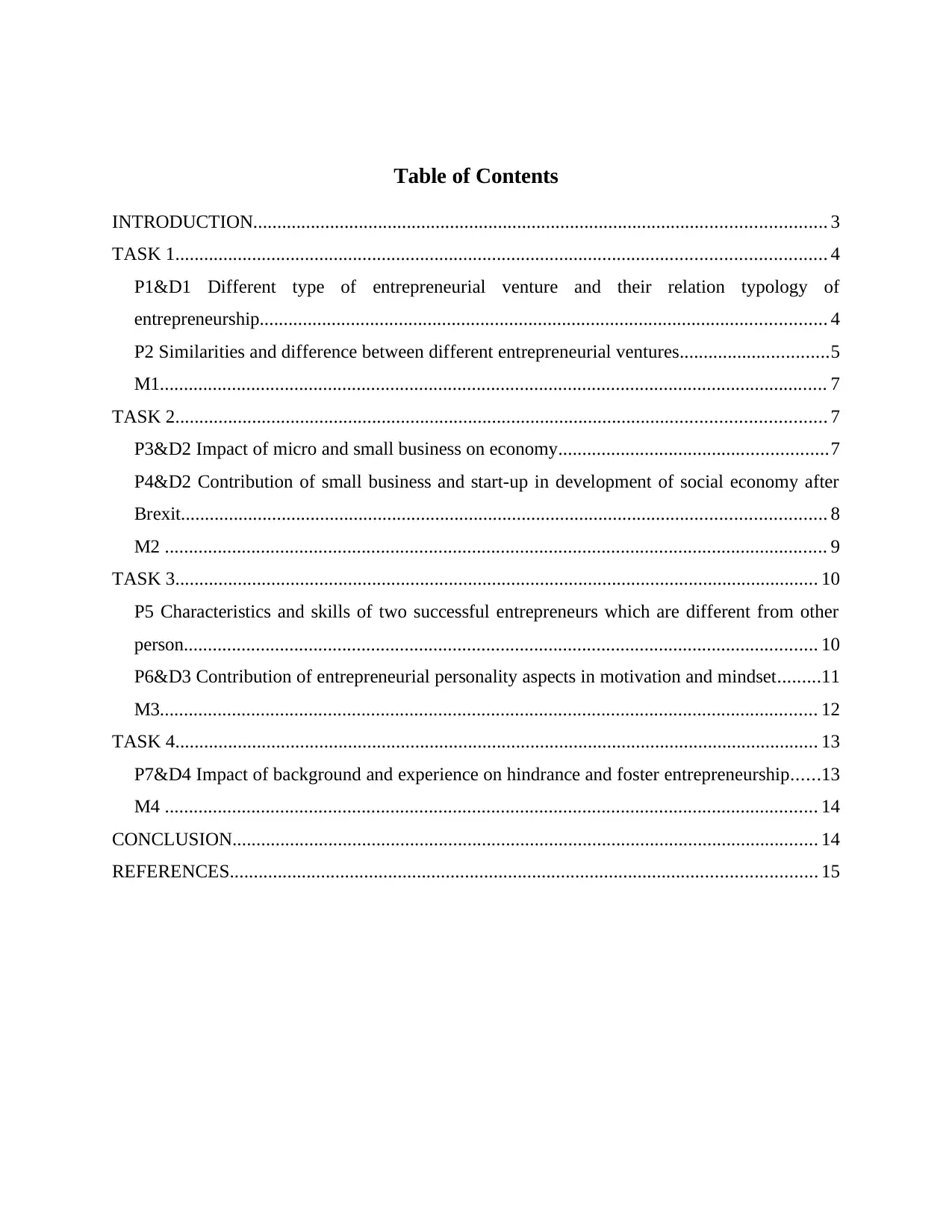
Table of Contents
INTRODUCTION....................................................................................................................... 3
TASK 1....................................................................................................................................... 4
P1&D1 Different type of entrepreneurial venture and their relation typology of
entrepreneurship...................................................................................................................... 4
P2 Similarities and difference between different entrepreneurial ventures...............................5
M1........................................................................................................................................... 7
TASK 2....................................................................................................................................... 7
P3&D2 Impact of micro and small business on economy........................................................7
P4&D2 Contribution of small business and start-up in development of social economy after
Brexit...................................................................................................................................... 8
M2 .......................................................................................................................................... 9
TASK 3...................................................................................................................................... 10
P5 Characteristics and skills of two successful entrepreneurs which are different from other
person.................................................................................................................................... 10
P6&D3 Contribution of entrepreneurial personality aspects in motivation and mindset.........11
M3......................................................................................................................................... 12
TASK 4...................................................................................................................................... 13
P7&D4 Impact of background and experience on hindrance and foster entrepreneurship......13
M4 ........................................................................................................................................ 14
CONCLUSION.......................................................................................................................... 14
REFERENCES.......................................................................................................................... 15
INTRODUCTION....................................................................................................................... 3
TASK 1....................................................................................................................................... 4
P1&D1 Different type of entrepreneurial venture and their relation typology of
entrepreneurship...................................................................................................................... 4
P2 Similarities and difference between different entrepreneurial ventures...............................5
M1........................................................................................................................................... 7
TASK 2....................................................................................................................................... 7
P3&D2 Impact of micro and small business on economy........................................................7
P4&D2 Contribution of small business and start-up in development of social economy after
Brexit...................................................................................................................................... 8
M2 .......................................................................................................................................... 9
TASK 3...................................................................................................................................... 10
P5 Characteristics and skills of two successful entrepreneurs which are different from other
person.................................................................................................................................... 10
P6&D3 Contribution of entrepreneurial personality aspects in motivation and mindset.........11
M3......................................................................................................................................... 12
TASK 4...................................................................................................................................... 13
P7&D4 Impact of background and experience on hindrance and foster entrepreneurship......13
M4 ........................................................................................................................................ 14
CONCLUSION.......................................................................................................................... 14
REFERENCES.......................................................................................................................... 15
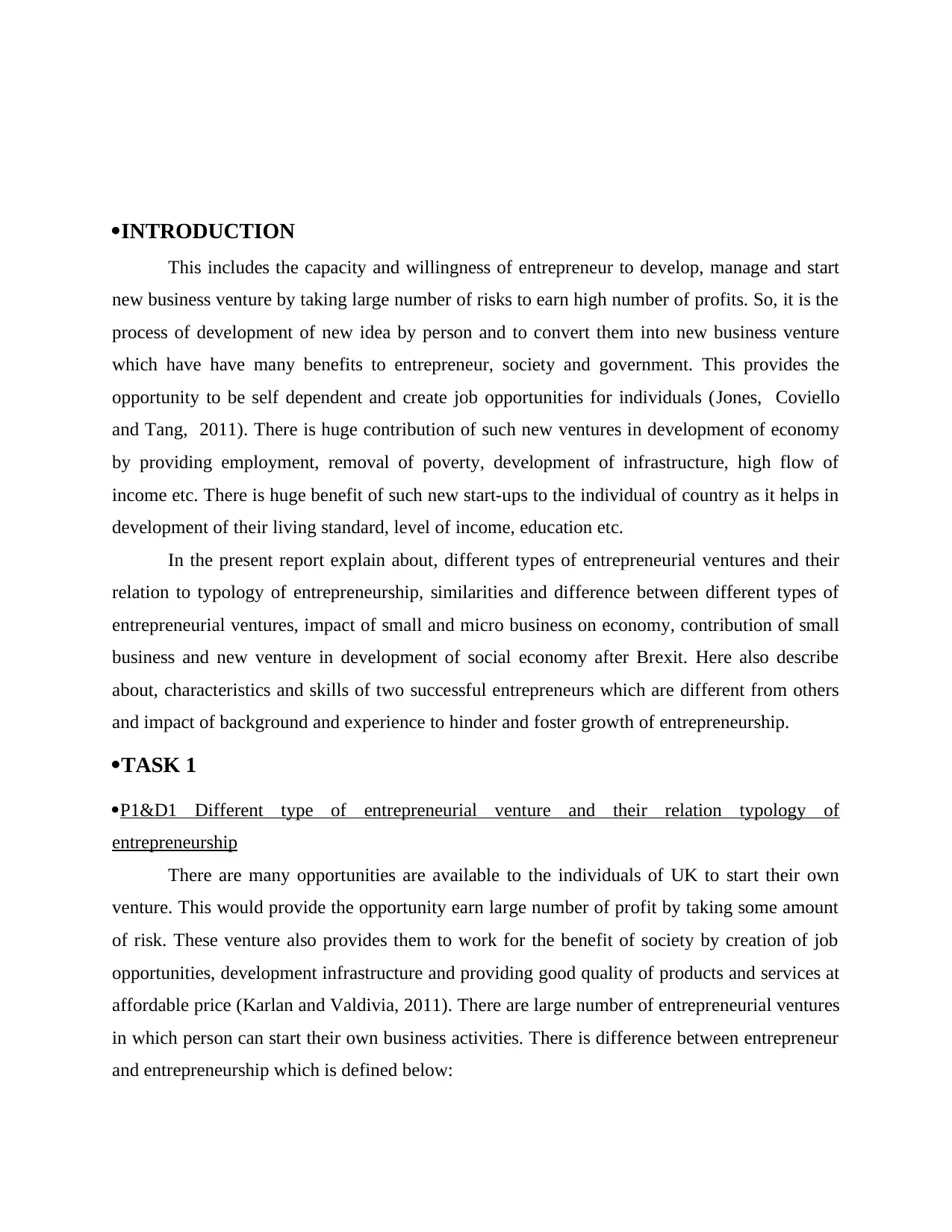
·INTRODUCTION
This includes the capacity and willingness of entrepreneur to develop, manage and start
new business venture by taking large number of risks to earn high number of profits. So, it is the
process of development of new idea by person and to convert them into new business venture
which have have many benefits to entrepreneur, society and government. This provides the
opportunity to be self dependent and create job opportunities for individuals (Jones, Coviello
and Tang, 2011). There is huge contribution of such new ventures in development of economy
by providing employment, removal of poverty, development of infrastructure, high flow of
income etc. There is huge benefit of such new start-ups to the individual of country as it helps in
development of their living standard, level of income, education etc.
In the present report explain about, different types of entrepreneurial ventures and their
relation to typology of entrepreneurship, similarities and difference between different types of
entrepreneurial ventures, impact of small and micro business on economy, contribution of small
business and new venture in development of social economy after Brexit. Here also describe
about, characteristics and skills of two successful entrepreneurs which are different from others
and impact of background and experience to hinder and foster growth of entrepreneurship.
·TASK 1
·P1&D1 Different type of entrepreneurial venture and their relation typology of
entrepreneurship
There are many opportunities are available to the individuals of UK to start their own
venture. This would provide the opportunity earn large number of profit by taking some amount
of risk. These venture also provides them to work for the benefit of society by creation of job
opportunities, development infrastructure and providing good quality of products and services at
affordable price (Karlan and Valdivia, 2011). There are large number of entrepreneurial ventures
in which person can start their own business activities. There is difference between entrepreneur
and entrepreneurship which is defined below:
This includes the capacity and willingness of entrepreneur to develop, manage and start
new business venture by taking large number of risks to earn high number of profits. So, it is the
process of development of new idea by person and to convert them into new business venture
which have have many benefits to entrepreneur, society and government. This provides the
opportunity to be self dependent and create job opportunities for individuals (Jones, Coviello
and Tang, 2011). There is huge contribution of such new ventures in development of economy
by providing employment, removal of poverty, development of infrastructure, high flow of
income etc. There is huge benefit of such new start-ups to the individual of country as it helps in
development of their living standard, level of income, education etc.
In the present report explain about, different types of entrepreneurial ventures and their
relation to typology of entrepreneurship, similarities and difference between different types of
entrepreneurial ventures, impact of small and micro business on economy, contribution of small
business and new venture in development of social economy after Brexit. Here also describe
about, characteristics and skills of two successful entrepreneurs which are different from others
and impact of background and experience to hinder and foster growth of entrepreneurship.
·TASK 1
·P1&D1 Different type of entrepreneurial venture and their relation typology of
entrepreneurship
There are many opportunities are available to the individuals of UK to start their own
venture. This would provide the opportunity earn large number of profit by taking some amount
of risk. These venture also provides them to work for the benefit of society by creation of job
opportunities, development infrastructure and providing good quality of products and services at
affordable price (Karlan and Valdivia, 2011). There are large number of entrepreneurial ventures
in which person can start their own business activities. There is difference between entrepreneur
and entrepreneurship which is defined below:
⊘ This is a preview!⊘
Do you want full access?
Subscribe today to unlock all pages.

Trusted by 1+ million students worldwide
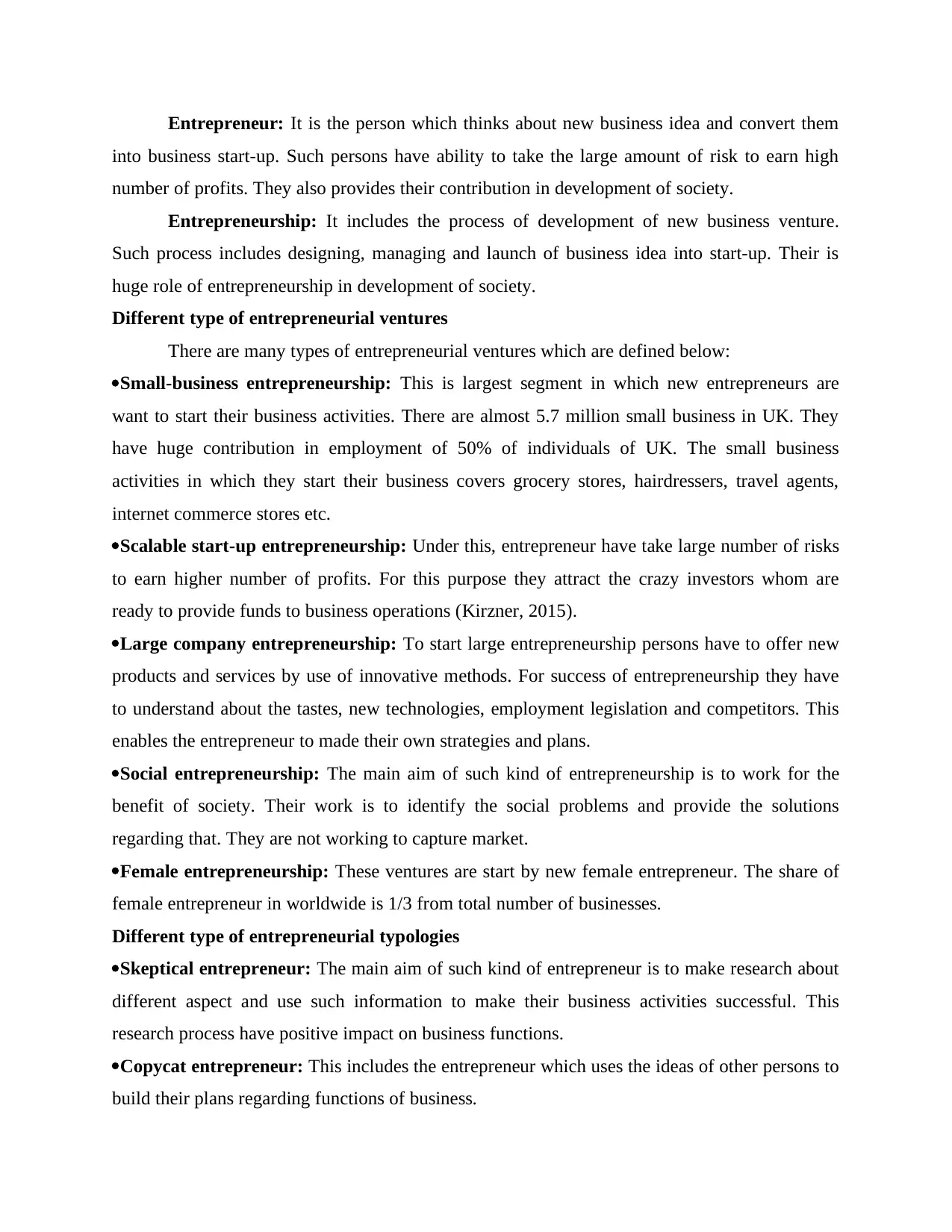
Entrepreneur: It is the person which thinks about new business idea and convert them
into business start-up. Such persons have ability to take the large amount of risk to earn high
number of profits. They also provides their contribution in development of society.
Entrepreneurship: It includes the process of development of new business venture.
Such process includes designing, managing and launch of business idea into start-up. Their is
huge role of entrepreneurship in development of society.
Different type of entrepreneurial ventures
There are many types of entrepreneurial ventures which are defined below:
·Small-business entrepreneurship: This is largest segment in which new entrepreneurs are
want to start their business activities. There are almost 5.7 million small business in UK. They
have huge contribution in employment of 50% of individuals of UK. The small business
activities in which they start their business covers grocery stores, hairdressers, travel agents,
internet commerce stores etc.
·Scalable start-up entrepreneurship: Under this, entrepreneur have take large number of risks
to earn higher number of profits. For this purpose they attract the crazy investors whom are
ready to provide funds to business operations (Kirzner, 2015).
·Large company entrepreneurship: To start large entrepreneurship persons have to offer new
products and services by use of innovative methods. For success of entrepreneurship they have
to understand about the tastes, new technologies, employment legislation and competitors. This
enables the entrepreneur to made their own strategies and plans.
·Social entrepreneurship: The main aim of such kind of entrepreneurship is to work for the
benefit of society. Their work is to identify the social problems and provide the solutions
regarding that. They are not working to capture market.
·Female entrepreneurship: These ventures are start by new female entrepreneur. The share of
female entrepreneur in worldwide is 1/3 from total number of businesses.
Different type of entrepreneurial typologies
·Skeptical entrepreneur: The main aim of such kind of entrepreneur is to make research about
different aspect and use such information to make their business activities successful. This
research process have positive impact on business functions.
·Copycat entrepreneur: This includes the entrepreneur which uses the ideas of other persons to
build their plans regarding functions of business.
into business start-up. Such persons have ability to take the large amount of risk to earn high
number of profits. They also provides their contribution in development of society.
Entrepreneurship: It includes the process of development of new business venture.
Such process includes designing, managing and launch of business idea into start-up. Their is
huge role of entrepreneurship in development of society.
Different type of entrepreneurial ventures
There are many types of entrepreneurial ventures which are defined below:
·Small-business entrepreneurship: This is largest segment in which new entrepreneurs are
want to start their business activities. There are almost 5.7 million small business in UK. They
have huge contribution in employment of 50% of individuals of UK. The small business
activities in which they start their business covers grocery stores, hairdressers, travel agents,
internet commerce stores etc.
·Scalable start-up entrepreneurship: Under this, entrepreneur have take large number of risks
to earn higher number of profits. For this purpose they attract the crazy investors whom are
ready to provide funds to business operations (Kirzner, 2015).
·Large company entrepreneurship: To start large entrepreneurship persons have to offer new
products and services by use of innovative methods. For success of entrepreneurship they have
to understand about the tastes, new technologies, employment legislation and competitors. This
enables the entrepreneur to made their own strategies and plans.
·Social entrepreneurship: The main aim of such kind of entrepreneurship is to work for the
benefit of society. Their work is to identify the social problems and provide the solutions
regarding that. They are not working to capture market.
·Female entrepreneurship: These ventures are start by new female entrepreneur. The share of
female entrepreneur in worldwide is 1/3 from total number of businesses.
Different type of entrepreneurial typologies
·Skeptical entrepreneur: The main aim of such kind of entrepreneur is to make research about
different aspect and use such information to make their business activities successful. This
research process have positive impact on business functions.
·Copycat entrepreneur: This includes the entrepreneur which uses the ideas of other persons to
build their plans regarding functions of business.
Paraphrase This Document
Need a fresh take? Get an instant paraphrase of this document with our AI Paraphraser
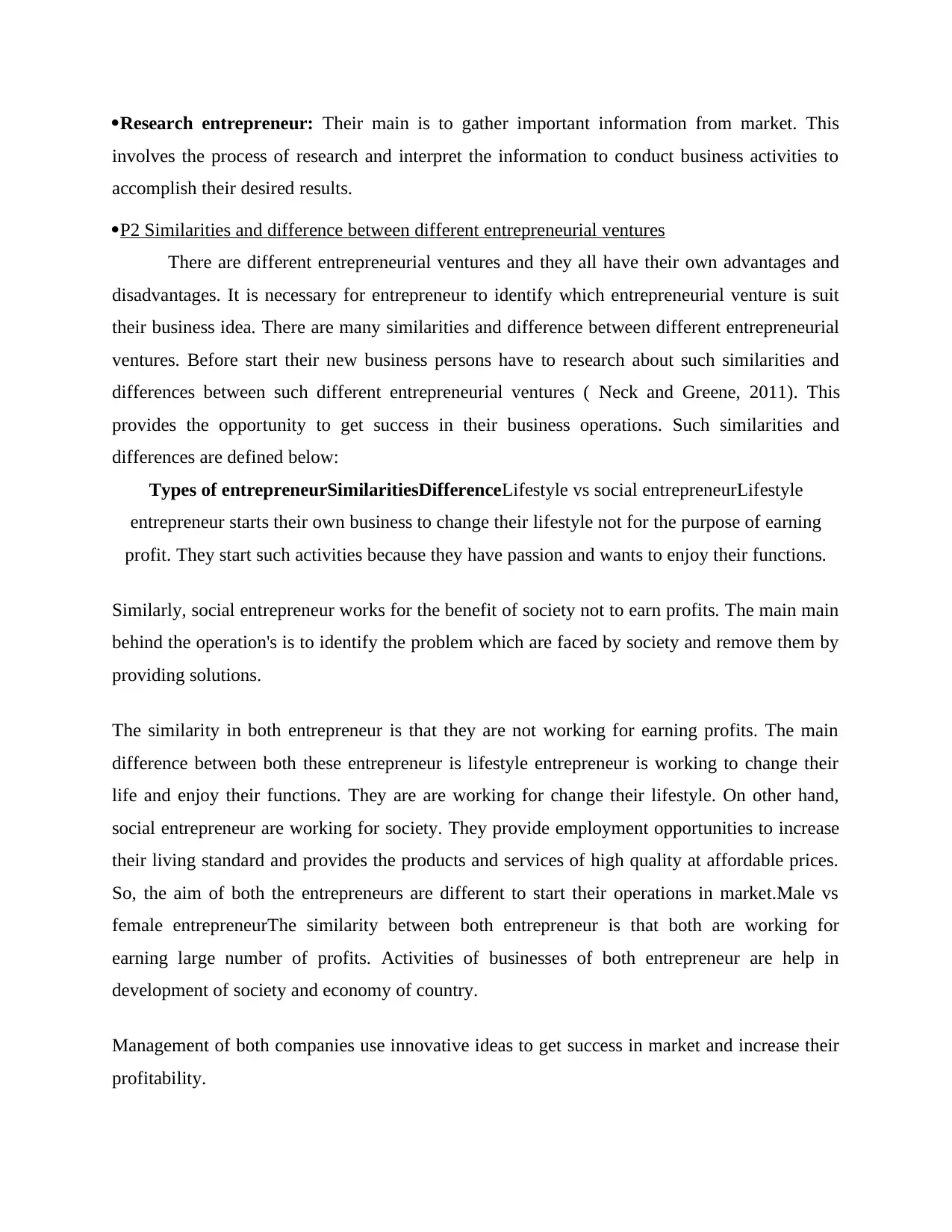
·Research entrepreneur: Their main is to gather important information from market. This
involves the process of research and interpret the information to conduct business activities to
accomplish their desired results.
·P2 Similarities and difference between different entrepreneurial ventures
There are different entrepreneurial ventures and they all have their own advantages and
disadvantages. It is necessary for entrepreneur to identify which entrepreneurial venture is suit
their business idea. There are many similarities and difference between different entrepreneurial
ventures. Before start their new business persons have to research about such similarities and
differences between such different entrepreneurial ventures ( Neck and Greene, 2011). This
provides the opportunity to get success in their business operations. Such similarities and
differences are defined below:
Types of entrepreneurSimilaritiesDifferenceLifestyle vs social entrepreneurLifestyle
entrepreneur starts their own business to change their lifestyle not for the purpose of earning
profit. They start such activities because they have passion and wants to enjoy their functions.
Similarly, social entrepreneur works for the benefit of society not to earn profits. The main main
behind the operation's is to identify the problem which are faced by society and remove them by
providing solutions.
The similarity in both entrepreneur is that they are not working for earning profits. The main
difference between both these entrepreneur is lifestyle entrepreneur is working to change their
life and enjoy their functions. They are are working for change their lifestyle. On other hand,
social entrepreneur are working for society. They provide employment opportunities to increase
their living standard and provides the products and services of high quality at affordable prices.
So, the aim of both the entrepreneurs are different to start their operations in market.Male vs
female entrepreneurThe similarity between both entrepreneur is that both are working for
earning large number of profits. Activities of businesses of both entrepreneur are help in
development of society and economy of country.
Management of both companies use innovative ideas to get success in market and increase their
profitability.
involves the process of research and interpret the information to conduct business activities to
accomplish their desired results.
·P2 Similarities and difference between different entrepreneurial ventures
There are different entrepreneurial ventures and they all have their own advantages and
disadvantages. It is necessary for entrepreneur to identify which entrepreneurial venture is suit
their business idea. There are many similarities and difference between different entrepreneurial
ventures. Before start their new business persons have to research about such similarities and
differences between such different entrepreneurial ventures ( Neck and Greene, 2011). This
provides the opportunity to get success in their business operations. Such similarities and
differences are defined below:
Types of entrepreneurSimilaritiesDifferenceLifestyle vs social entrepreneurLifestyle
entrepreneur starts their own business to change their lifestyle not for the purpose of earning
profit. They start such activities because they have passion and wants to enjoy their functions.
Similarly, social entrepreneur works for the benefit of society not to earn profits. The main main
behind the operation's is to identify the problem which are faced by society and remove them by
providing solutions.
The similarity in both entrepreneur is that they are not working for earning profits. The main
difference between both these entrepreneur is lifestyle entrepreneur is working to change their
life and enjoy their functions. They are are working for change their lifestyle. On other hand,
social entrepreneur are working for society. They provide employment opportunities to increase
their living standard and provides the products and services of high quality at affordable prices.
So, the aim of both the entrepreneurs are different to start their operations in market.Male vs
female entrepreneurThe similarity between both entrepreneur is that both are working for
earning large number of profits. Activities of businesses of both entrepreneur are help in
development of society and economy of country.
Management of both companies use innovative ideas to get success in market and increase their
profitability.
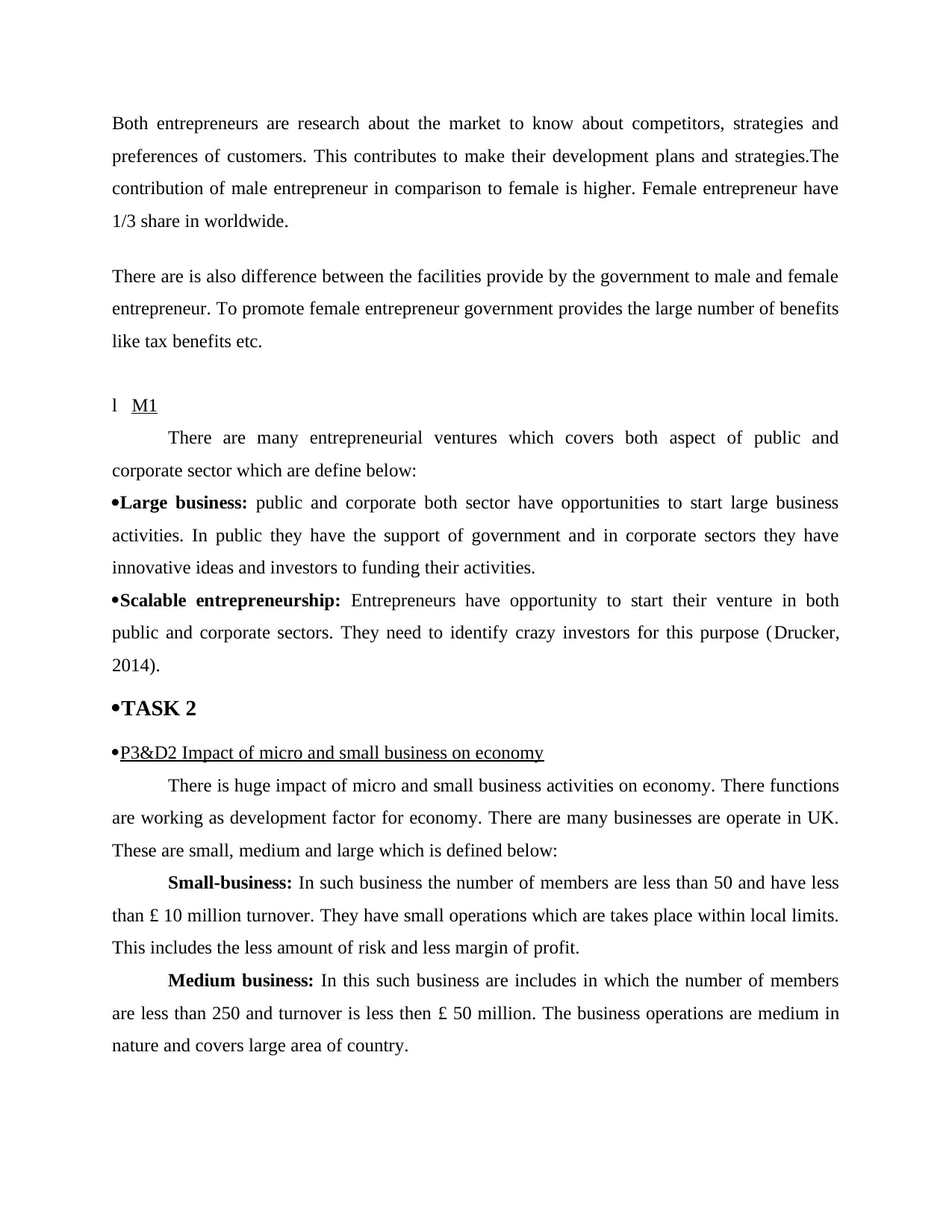
Both entrepreneurs are research about the market to know about competitors, strategies and
preferences of customers. This contributes to make their development plans and strategies.The
contribution of male entrepreneur in comparison to female is higher. Female entrepreneur have
1/3 share in worldwide.
There are is also difference between the facilities provide by the government to male and female
entrepreneur. To promote female entrepreneur government provides the large number of benefits
like tax benefits etc.
l壱M1
There are many entrepreneurial ventures which covers both aspect of public and
corporate sector which are define below:
·Large business: public and corporate both sector have opportunities to start large business
activities. In public they have the support of government and in corporate sectors they have
innovative ideas and investors to funding their activities.
·Scalable entrepreneurship: Entrepreneurs have opportunity to start their venture in both
public and corporate sectors. They need to identify crazy investors for this purpose (Drucker,
2014).
·TASK 2
·P3&D2 Impact of micro and small business on economy
There is huge impact of micro and small business activities on economy. There functions
are working as development factor for economy. There are many businesses are operate in UK.
These are small, medium and large which is defined below:
Small-business: In such business the number of members are less than 50 and have less
than £ 10 million turnover. They have small operations which are takes place within local limits.
This includes the less amount of risk and less margin of profit.
Medium business: In this such business are includes in which the number of members
are less than 250 and turnover is less then £ 50 million. The business operations are medium in
nature and covers large area of country.
preferences of customers. This contributes to make their development plans and strategies.The
contribution of male entrepreneur in comparison to female is higher. Female entrepreneur have
1/3 share in worldwide.
There are is also difference between the facilities provide by the government to male and female
entrepreneur. To promote female entrepreneur government provides the large number of benefits
like tax benefits etc.
l壱M1
There are many entrepreneurial ventures which covers both aspect of public and
corporate sector which are define below:
·Large business: public and corporate both sector have opportunities to start large business
activities. In public they have the support of government and in corporate sectors they have
innovative ideas and investors to funding their activities.
·Scalable entrepreneurship: Entrepreneurs have opportunity to start their venture in both
public and corporate sectors. They need to identify crazy investors for this purpose (Drucker,
2014).
·TASK 2
·P3&D2 Impact of micro and small business on economy
There is huge impact of micro and small business activities on economy. There functions
are working as development factor for economy. There are many businesses are operate in UK.
These are small, medium and large which is defined below:
Small-business: In such business the number of members are less than 50 and have less
than £ 10 million turnover. They have small operations which are takes place within local limits.
This includes the less amount of risk and less margin of profit.
Medium business: In this such business are includes in which the number of members
are less than 250 and turnover is less then £ 50 million. The business operations are medium in
nature and covers large area of country.
⊘ This is a preview!⊘
Do you want full access?
Subscribe today to unlock all pages.

Trusted by 1+ million students worldwide
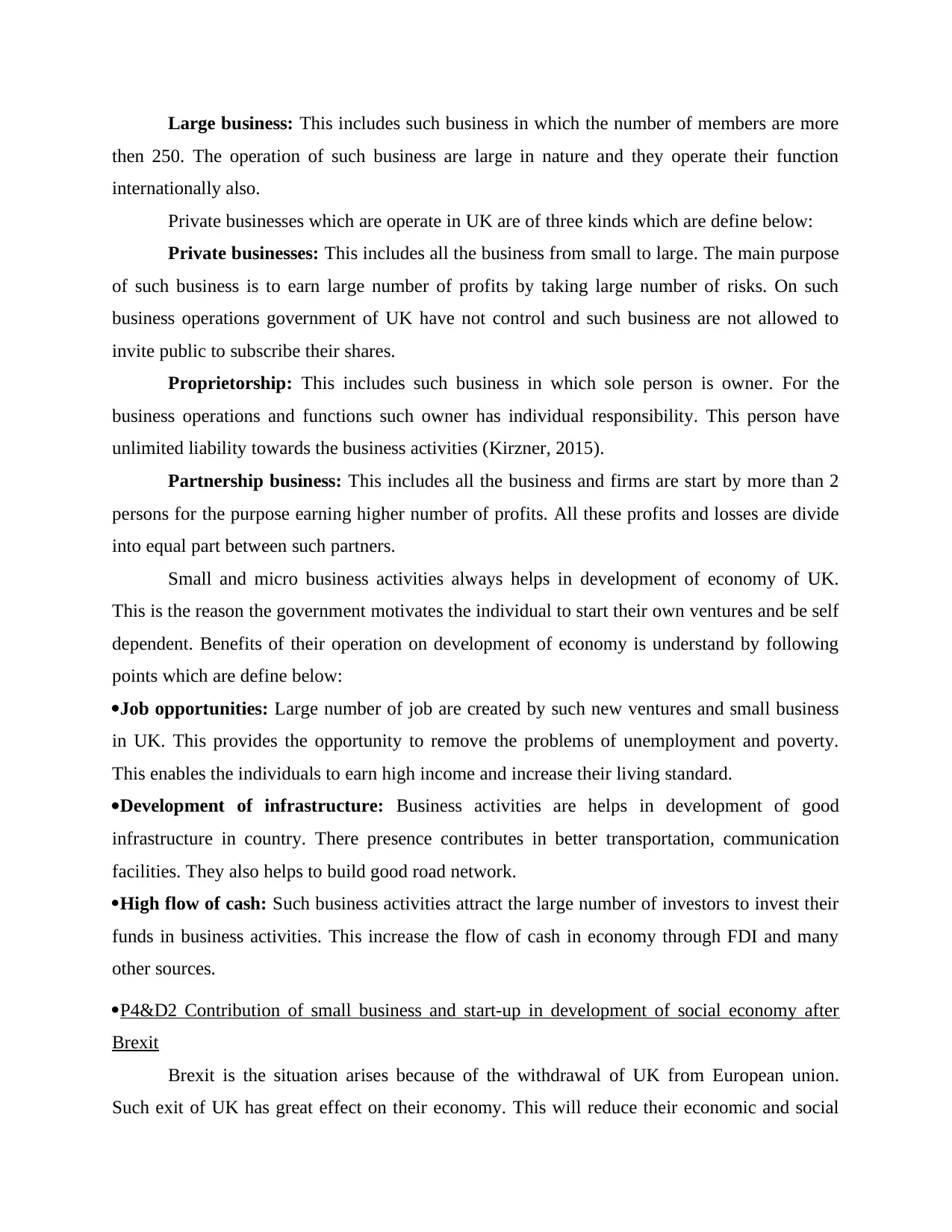
Large business: This includes such business in which the number of members are more
then 250. The operation of such business are large in nature and they operate their function
internationally also.
Private businesses which are operate in UK are of three kinds which are define below:
Private businesses: This includes all the business from small to large. The main purpose
of such business is to earn large number of profits by taking large number of risks. On such
business operations government of UK have not control and such business are not allowed to
invite public to subscribe their shares.
Proprietorship: This includes such business in which sole person is owner. For the
business operations and functions such owner has individual responsibility. This person have
unlimited liability towards the business activities (Kirzner, 2015).
Partnership business: This includes all the business and firms are start by more than 2
persons for the purpose earning higher number of profits. All these profits and losses are divide
into equal part between such partners.
Small and micro business activities always helps in development of economy of UK.
This is the reason the government motivates the individual to start their own ventures and be self
dependent. Benefits of their operation on development of economy is understand by following
points which are define below:
·Job opportunities: Large number of job are created by such new ventures and small business
in UK. This provides the opportunity to remove the problems of unemployment and poverty.
This enables the individuals to earn high income and increase their living standard.
·Development of infrastructure: Business activities are helps in development of good
infrastructure in country. There presence contributes in better transportation, communication
facilities. They also helps to build good road network.
·High flow of cash: Such business activities attract the large number of investors to invest their
funds in business activities. This increase the flow of cash in economy through FDI and many
other sources.
·P4&D2 Contribution of small business and start-up in development of social economy after
Brexit
Brexit is the situation arises because of the withdrawal of UK from European union.
Such exit of UK has great effect on their economy. This will reduce their economic and social
then 250. The operation of such business are large in nature and they operate their function
internationally also.
Private businesses which are operate in UK are of three kinds which are define below:
Private businesses: This includes all the business from small to large. The main purpose
of such business is to earn large number of profits by taking large number of risks. On such
business operations government of UK have not control and such business are not allowed to
invite public to subscribe their shares.
Proprietorship: This includes such business in which sole person is owner. For the
business operations and functions such owner has individual responsibility. This person have
unlimited liability towards the business activities (Kirzner, 2015).
Partnership business: This includes all the business and firms are start by more than 2
persons for the purpose earning higher number of profits. All these profits and losses are divide
into equal part between such partners.
Small and micro business activities always helps in development of economy of UK.
This is the reason the government motivates the individual to start their own ventures and be self
dependent. Benefits of their operation on development of economy is understand by following
points which are define below:
·Job opportunities: Large number of job are created by such new ventures and small business
in UK. This provides the opportunity to remove the problems of unemployment and poverty.
This enables the individuals to earn high income and increase their living standard.
·Development of infrastructure: Business activities are helps in development of good
infrastructure in country. There presence contributes in better transportation, communication
facilities. They also helps to build good road network.
·High flow of cash: Such business activities attract the large number of investors to invest their
funds in business activities. This increase the flow of cash in economy through FDI and many
other sources.
·P4&D2 Contribution of small business and start-up in development of social economy after
Brexit
Brexit is the situation arises because of the withdrawal of UK from European union.
Such exit of UK has great effect on their economy. This will reduce their economic and social
Paraphrase This Document
Need a fresh take? Get an instant paraphrase of this document with our AI Paraphraser
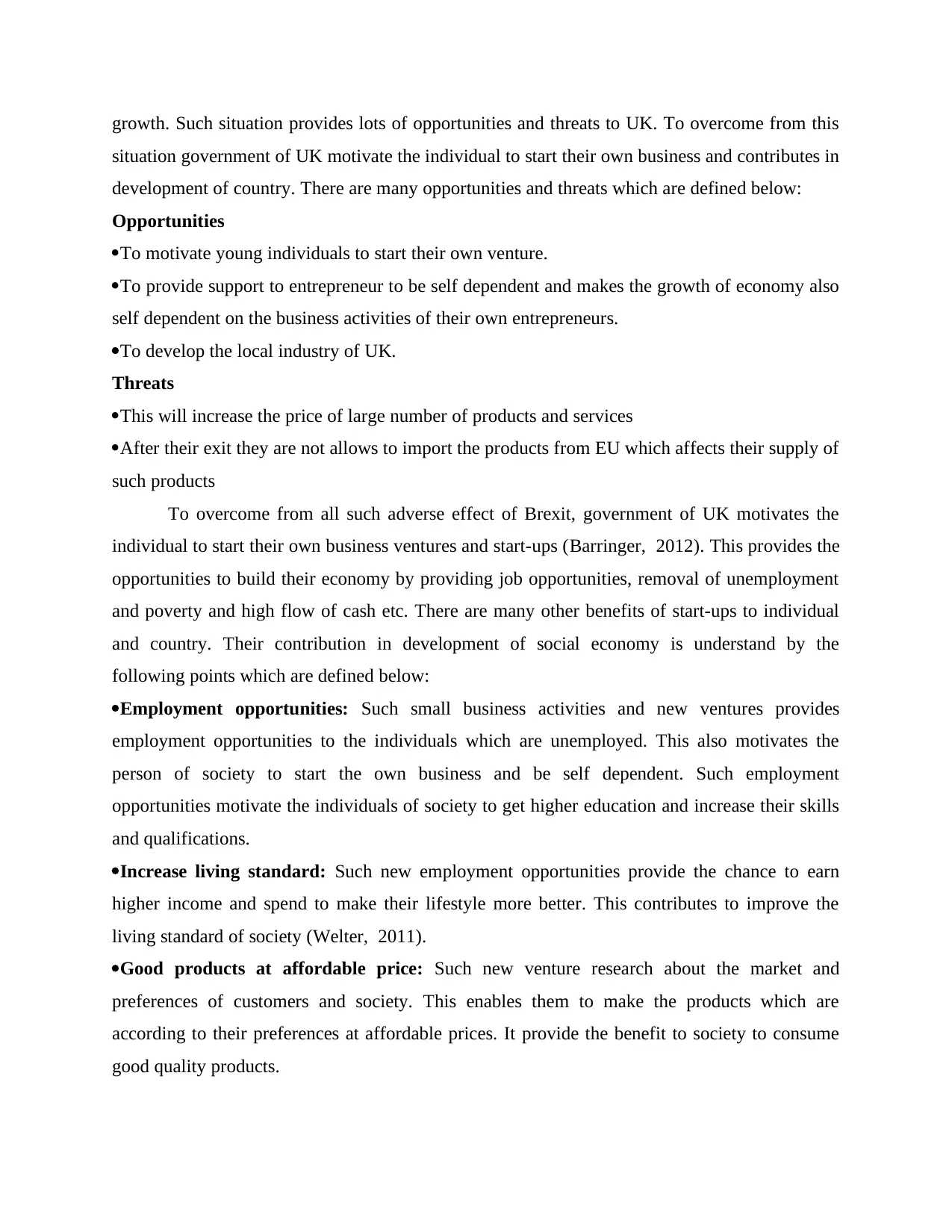
growth. Such situation provides lots of opportunities and threats to UK. To overcome from this
situation government of UK motivate the individual to start their own business and contributes in
development of country. There are many opportunities and threats which are defined below:
Opportunities
·To motivate young individuals to start their own venture.
·To provide support to entrepreneur to be self dependent and makes the growth of economy also
self dependent on the business activities of their own entrepreneurs.
·To develop the local industry of UK.
Threats
·This will increase the price of large number of products and services
·After their exit they are not allows to import the products from EU which affects their supply of
such products
To overcome from all such adverse effect of Brexit, government of UK motivates the
individual to start their own business ventures and start-ups (Barringer, 2012). This provides the
opportunities to build their economy by providing job opportunities, removal of unemployment
and poverty and high flow of cash etc. There are many other benefits of start-ups to individual
and country. Their contribution in development of social economy is understand by the
following points which are defined below:
·Employment opportunities: Such small business activities and new ventures provides
employment opportunities to the individuals which are unemployed. This also motivates the
person of society to start the own business and be self dependent. Such employment
opportunities motivate the individuals of society to get higher education and increase their skills
and qualifications.
·Increase living standard: Such new employment opportunities provide the chance to earn
higher income and spend to make their lifestyle more better. This contributes to improve the
living standard of society (Welter, 2011).
·Good products at affordable price: Such new venture research about the market and
preferences of customers and society. This enables them to make the products which are
according to their preferences at affordable prices. It provide the benefit to society to consume
good quality products.
situation government of UK motivate the individual to start their own business and contributes in
development of country. There are many opportunities and threats which are defined below:
Opportunities
·To motivate young individuals to start their own venture.
·To provide support to entrepreneur to be self dependent and makes the growth of economy also
self dependent on the business activities of their own entrepreneurs.
·To develop the local industry of UK.
Threats
·This will increase the price of large number of products and services
·After their exit they are not allows to import the products from EU which affects their supply of
such products
To overcome from all such adverse effect of Brexit, government of UK motivates the
individual to start their own business ventures and start-ups (Barringer, 2012). This provides the
opportunities to build their economy by providing job opportunities, removal of unemployment
and poverty and high flow of cash etc. There are many other benefits of start-ups to individual
and country. Their contribution in development of social economy is understand by the
following points which are defined below:
·Employment opportunities: Such small business activities and new ventures provides
employment opportunities to the individuals which are unemployed. This also motivates the
person of society to start the own business and be self dependent. Such employment
opportunities motivate the individuals of society to get higher education and increase their skills
and qualifications.
·Increase living standard: Such new employment opportunities provide the chance to earn
higher income and spend to make their lifestyle more better. This contributes to improve the
living standard of society (Welter, 2011).
·Good products at affordable price: Such new venture research about the market and
preferences of customers and society. This enables them to make the products which are
according to their preferences at affordable prices. It provide the benefit to society to consume
good quality products.
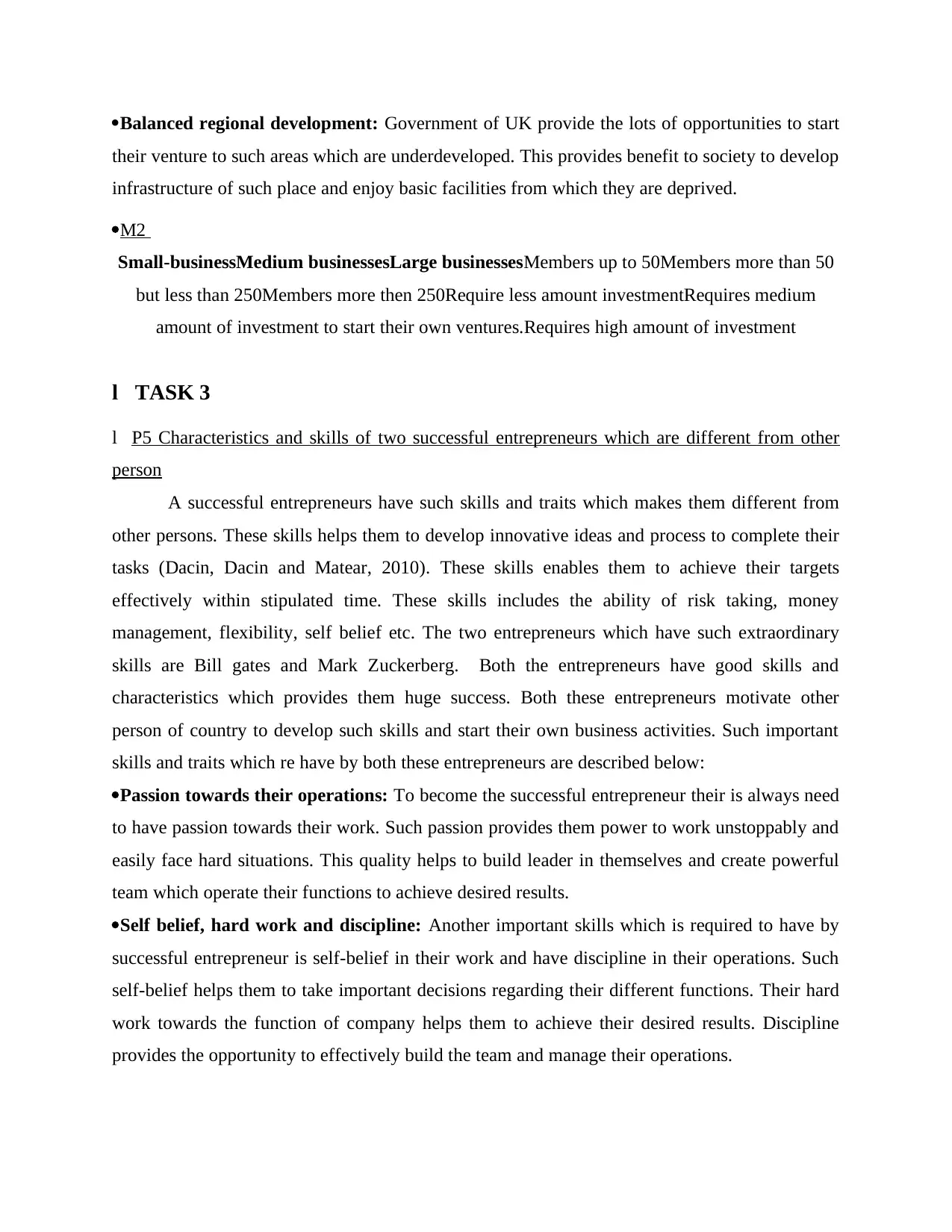
·Balanced regional development: Government of UK provide the lots of opportunities to start
their venture to such areas which are underdeveloped. This provides benefit to society to develop
infrastructure of such place and enjoy basic facilities from which they are deprived.
·M2
Small-businessMedium businessesLarge businessesMembers up to 50Members more than 50
but less than 250Members more then 250Require less amount investmentRequires medium
amount of investment to start their own ventures.Requires high amount of investment
l壱TASK 3
l壱P5 Characteristics and skills of two successful entrepreneurs which are different from other
person
A successful entrepreneurs have such skills and traits which makes them different from
other persons. These skills helps them to develop innovative ideas and process to complete their
tasks (Dacin, Dacin and Matear, 2010). These skills enables them to achieve their targets
effectively within stipulated time. These skills includes the ability of risk taking, money
management, flexibility, self belief etc. The two entrepreneurs which have such extraordinary
skills are Bill gates and Mark Zuckerberg. Both the entrepreneurs have good skills and
characteristics which provides them huge success. Both these entrepreneurs motivate other
person of country to develop such skills and start their own business activities. Such important
skills and traits which re have by both these entrepreneurs are described below:
·Passion towards their operations: To become the successful entrepreneur their is always need
to have passion towards their work. Such passion provides them power to work unstoppably and
easily face hard situations. This quality helps to build leader in themselves and create powerful
team which operate their functions to achieve desired results.
·Self belief, hard work and discipline: Another important skills which is required to have by
successful entrepreneur is self-belief in their work and have discipline in their operations. Such
self-belief helps them to take important decisions regarding their different functions. Their hard
work towards the function of company helps them to achieve their desired results. Discipline
provides the opportunity to effectively build the team and manage their operations.
their venture to such areas which are underdeveloped. This provides benefit to society to develop
infrastructure of such place and enjoy basic facilities from which they are deprived.
·M2
Small-businessMedium businessesLarge businessesMembers up to 50Members more than 50
but less than 250Members more then 250Require less amount investmentRequires medium
amount of investment to start their own ventures.Requires high amount of investment
l壱TASK 3
l壱P5 Characteristics and skills of two successful entrepreneurs which are different from other
person
A successful entrepreneurs have such skills and traits which makes them different from
other persons. These skills helps them to develop innovative ideas and process to complete their
tasks (Dacin, Dacin and Matear, 2010). These skills enables them to achieve their targets
effectively within stipulated time. These skills includes the ability of risk taking, money
management, flexibility, self belief etc. The two entrepreneurs which have such extraordinary
skills are Bill gates and Mark Zuckerberg. Both the entrepreneurs have good skills and
characteristics which provides them huge success. Both these entrepreneurs motivate other
person of country to develop such skills and start their own business activities. Such important
skills and traits which re have by both these entrepreneurs are described below:
·Passion towards their operations: To become the successful entrepreneur their is always need
to have passion towards their work. Such passion provides them power to work unstoppably and
easily face hard situations. This quality helps to build leader in themselves and create powerful
team which operate their functions to achieve desired results.
·Self belief, hard work and discipline: Another important skills which is required to have by
successful entrepreneur is self-belief in their work and have discipline in their operations. Such
self-belief helps them to take important decisions regarding their different functions. Their hard
work towards the function of company helps them to achieve their desired results. Discipline
provides the opportunity to effectively build the team and manage their operations.
⊘ This is a preview!⊘
Do you want full access?
Subscribe today to unlock all pages.

Trusted by 1+ million students worldwide
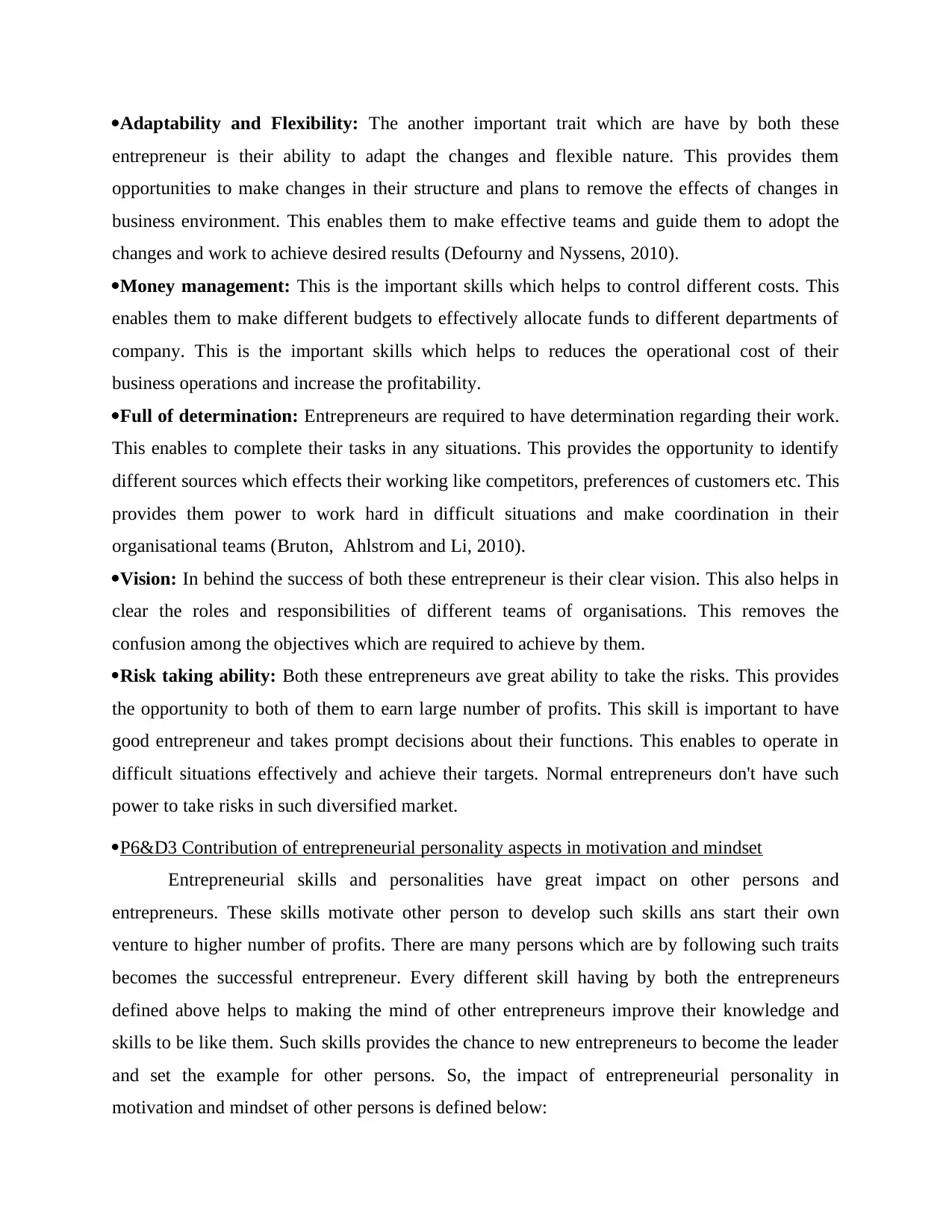
·Adaptability and Flexibility: The another important trait which are have by both these
entrepreneur is their ability to adapt the changes and flexible nature. This provides them
opportunities to make changes in their structure and plans to remove the effects of changes in
business environment. This enables them to make effective teams and guide them to adopt the
changes and work to achieve desired results (Defourny and Nyssens, 2010).
·Money management: This is the important skills which helps to control different costs. This
enables them to make different budgets to effectively allocate funds to different departments of
company. This is the important skills which helps to reduces the operational cost of their
business operations and increase the profitability.
·Full of determination: Entrepreneurs are required to have determination regarding their work.
This enables to complete their tasks in any situations. This provides the opportunity to identify
different sources which effects their working like competitors, preferences of customers etc. This
provides them power to work hard in difficult situations and make coordination in their
organisational teams (Bruton, Ahlstrom and Li, 2010).
·Vision: In behind the success of both these entrepreneur is their clear vision. This also helps in
clear the roles and responsibilities of different teams of organisations. This removes the
confusion among the objectives which are required to achieve by them.
·Risk taking ability: Both these entrepreneurs ave great ability to take the risks. This provides
the opportunity to both of them to earn large number of profits. This skill is important to have
good entrepreneur and takes prompt decisions about their functions. This enables to operate in
difficult situations effectively and achieve their targets. Normal entrepreneurs don't have such
power to take risks in such diversified market.
·P6&D3 Contribution of entrepreneurial personality aspects in motivation and mindset
Entrepreneurial skills and personalities have great impact on other persons and
entrepreneurs. These skills motivate other person to develop such skills ans start their own
venture to higher number of profits. There are many persons which are by following such traits
becomes the successful entrepreneur. Every different skill having by both the entrepreneurs
defined above helps to making the mind of other entrepreneurs improve their knowledge and
skills to be like them. Such skills provides the chance to new entrepreneurs to become the leader
and set the example for other persons. So, the impact of entrepreneurial personality in
motivation and mindset of other persons is defined below:
entrepreneur is their ability to adapt the changes and flexible nature. This provides them
opportunities to make changes in their structure and plans to remove the effects of changes in
business environment. This enables them to make effective teams and guide them to adopt the
changes and work to achieve desired results (Defourny and Nyssens, 2010).
·Money management: This is the important skills which helps to control different costs. This
enables them to make different budgets to effectively allocate funds to different departments of
company. This is the important skills which helps to reduces the operational cost of their
business operations and increase the profitability.
·Full of determination: Entrepreneurs are required to have determination regarding their work.
This enables to complete their tasks in any situations. This provides the opportunity to identify
different sources which effects their working like competitors, preferences of customers etc. This
provides them power to work hard in difficult situations and make coordination in their
organisational teams (Bruton, Ahlstrom and Li, 2010).
·Vision: In behind the success of both these entrepreneur is their clear vision. This also helps in
clear the roles and responsibilities of different teams of organisations. This removes the
confusion among the objectives which are required to achieve by them.
·Risk taking ability: Both these entrepreneurs ave great ability to take the risks. This provides
the opportunity to both of them to earn large number of profits. This skill is important to have
good entrepreneur and takes prompt decisions about their functions. This enables to operate in
difficult situations effectively and achieve their targets. Normal entrepreneurs don't have such
power to take risks in such diversified market.
·P6&D3 Contribution of entrepreneurial personality aspects in motivation and mindset
Entrepreneurial skills and personalities have great impact on other persons and
entrepreneurs. These skills motivate other person to develop such skills ans start their own
venture to higher number of profits. There are many persons which are by following such traits
becomes the successful entrepreneur. Every different skill having by both the entrepreneurs
defined above helps to making the mind of other entrepreneurs improve their knowledge and
skills to be like them. Such skills provides the chance to new entrepreneurs to become the leader
and set the example for other persons. So, the impact of entrepreneurial personality in
motivation and mindset of other persons is defined below:
Paraphrase This Document
Need a fresh take? Get an instant paraphrase of this document with our AI Paraphraser
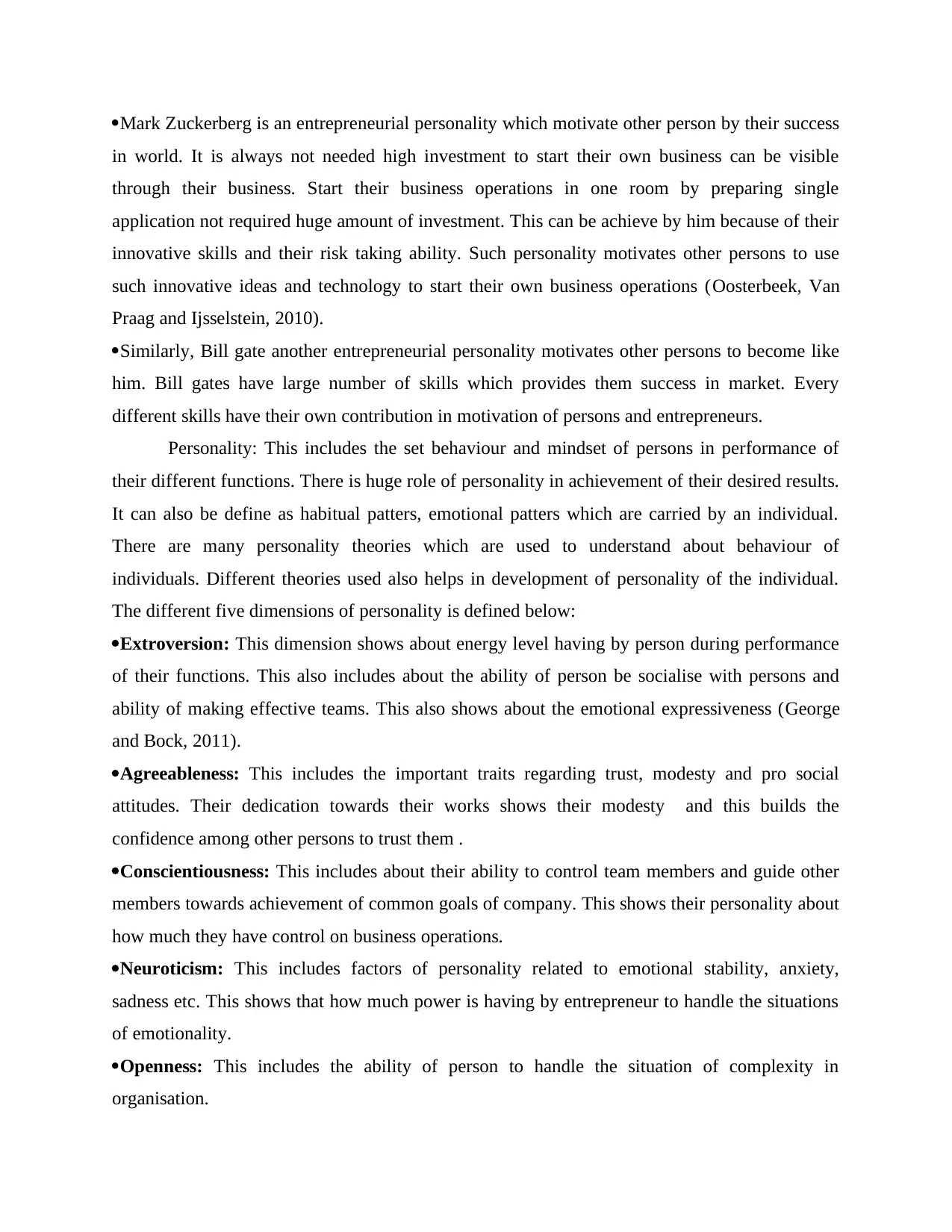
·Mark Zuckerberg is an entrepreneurial personality which motivate other person by their success
in world. It is always not needed high investment to start their own business can be visible
through their business. Start their business operations in one room by preparing single
application not required huge amount of investment. This can be achieve by him because of their
innovative skills and their risk taking ability. Such personality motivates other persons to use
such innovative ideas and technology to start their own business operations (Oosterbeek, Van
Praag and Ijsselstein, 2010).
·Similarly, Bill gate another entrepreneurial personality motivates other persons to become like
him. Bill gates have large number of skills which provides them success in market. Every
different skills have their own contribution in motivation of persons and entrepreneurs.
Personality: This includes the set behaviour and mindset of persons in performance of
their different functions. There is huge role of personality in achievement of their desired results.
It can also be define as habitual patters, emotional patters which are carried by an individual.
There are many personality theories which are used to understand about behaviour of
individuals. Different theories used also helps in development of personality of the individual.
The different five dimensions of personality is defined below:
·Extroversion: This dimension shows about energy level having by person during performance
of their functions. This also includes about the ability of person be socialise with persons and
ability of making effective teams. This also shows about the emotional expressiveness (George
and Bock, 2011).
·Agreeableness: This includes the important traits regarding trust, modesty and pro social
attitudes. Their dedication towards their works shows their modesty and this builds the
confidence among other persons to trust them .
·Conscientiousness: This includes about their ability to control team members and guide other
members towards achievement of common goals of company. This shows their personality about
how much they have control on business operations.
·Neuroticism: This includes factors of personality related to emotional stability, anxiety,
sadness etc. This shows that how much power is having by entrepreneur to handle the situations
of emotionality.
·Openness: This includes the ability of person to handle the situation of complexity in
organisation.
in world. It is always not needed high investment to start their own business can be visible
through their business. Start their business operations in one room by preparing single
application not required huge amount of investment. This can be achieve by him because of their
innovative skills and their risk taking ability. Such personality motivates other persons to use
such innovative ideas and technology to start their own business operations (Oosterbeek, Van
Praag and Ijsselstein, 2010).
·Similarly, Bill gate another entrepreneurial personality motivates other persons to become like
him. Bill gates have large number of skills which provides them success in market. Every
different skills have their own contribution in motivation of persons and entrepreneurs.
Personality: This includes the set behaviour and mindset of persons in performance of
their different functions. There is huge role of personality in achievement of their desired results.
It can also be define as habitual patters, emotional patters which are carried by an individual.
There are many personality theories which are used to understand about behaviour of
individuals. Different theories used also helps in development of personality of the individual.
The different five dimensions of personality is defined below:
·Extroversion: This dimension shows about energy level having by person during performance
of their functions. This also includes about the ability of person be socialise with persons and
ability of making effective teams. This also shows about the emotional expressiveness (George
and Bock, 2011).
·Agreeableness: This includes the important traits regarding trust, modesty and pro social
attitudes. Their dedication towards their works shows their modesty and this builds the
confidence among other persons to trust them .
·Conscientiousness: This includes about their ability to control team members and guide other
members towards achievement of common goals of company. This shows their personality about
how much they have control on business operations.
·Neuroticism: This includes factors of personality related to emotional stability, anxiety,
sadness etc. This shows that how much power is having by entrepreneur to handle the situations
of emotionality.
·Openness: This includes the ability of person to handle the situation of complexity in
organisation.
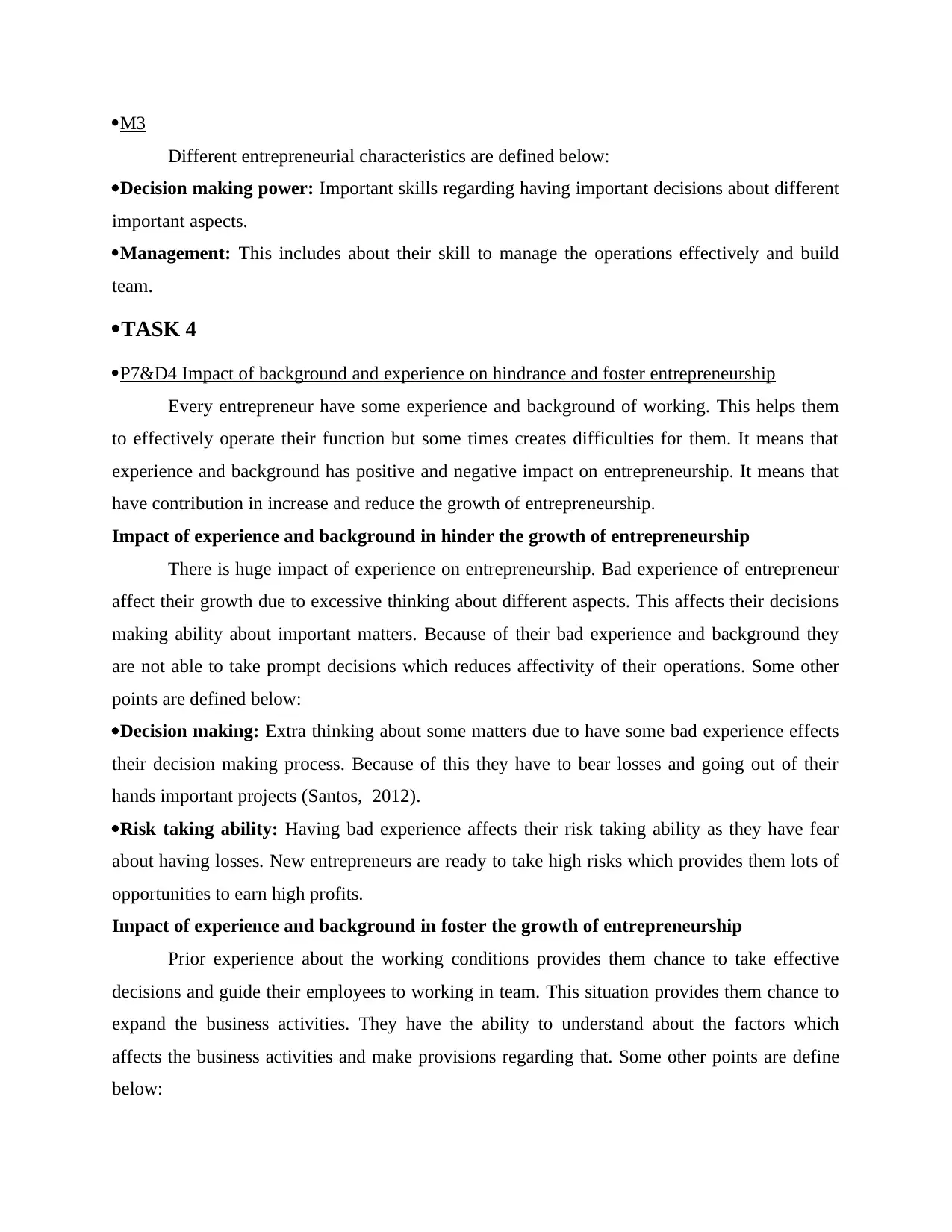
·M3
Different entrepreneurial characteristics are defined below:
·Decision making power: Important skills regarding having important decisions about different
important aspects.
·Management: This includes about their skill to manage the operations effectively and build
team.
·TASK 4
·P7&D4 Impact of background and experience on hindrance and foster entrepreneurship
Every entrepreneur have some experience and background of working. This helps them
to effectively operate their function but some times creates difficulties for them. It means that
experience and background has positive and negative impact on entrepreneurship. It means that
have contribution in increase and reduce the growth of entrepreneurship.
Impact of experience and background in hinder the growth of entrepreneurship
There is huge impact of experience on entrepreneurship. Bad experience of entrepreneur
affect their growth due to excessive thinking about different aspects. This affects their decisions
making ability about important matters. Because of their bad experience and background they
are not able to take prompt decisions which reduces affectivity of their operations. Some other
points are defined below:
·Decision making: Extra thinking about some matters due to have some bad experience effects
their decision making process. Because of this they have to bear losses and going out of their
hands important projects (Santos, 2012).
·Risk taking ability: Having bad experience affects their risk taking ability as they have fear
about having losses. New entrepreneurs are ready to take high risks which provides them lots of
opportunities to earn high profits.
Impact of experience and background in foster the growth of entrepreneurship
Prior experience about the working conditions provides them chance to take effective
decisions and guide their employees to working in team. This situation provides them chance to
expand the business activities. They have the ability to understand about the factors which
affects the business activities and make provisions regarding that. Some other points are define
below:
Different entrepreneurial characteristics are defined below:
·Decision making power: Important skills regarding having important decisions about different
important aspects.
·Management: This includes about their skill to manage the operations effectively and build
team.
·TASK 4
·P7&D4 Impact of background and experience on hindrance and foster entrepreneurship
Every entrepreneur have some experience and background of working. This helps them
to effectively operate their function but some times creates difficulties for them. It means that
experience and background has positive and negative impact on entrepreneurship. It means that
have contribution in increase and reduce the growth of entrepreneurship.
Impact of experience and background in hinder the growth of entrepreneurship
There is huge impact of experience on entrepreneurship. Bad experience of entrepreneur
affect their growth due to excessive thinking about different aspects. This affects their decisions
making ability about important matters. Because of their bad experience and background they
are not able to take prompt decisions which reduces affectivity of their operations. Some other
points are defined below:
·Decision making: Extra thinking about some matters due to have some bad experience effects
their decision making process. Because of this they have to bear losses and going out of their
hands important projects (Santos, 2012).
·Risk taking ability: Having bad experience affects their risk taking ability as they have fear
about having losses. New entrepreneurs are ready to take high risks which provides them lots of
opportunities to earn high profits.
Impact of experience and background in foster the growth of entrepreneurship
Prior experience about the working conditions provides them chance to take effective
decisions and guide their employees to working in team. This situation provides them chance to
expand the business activities. They have the ability to understand about the factors which
affects the business activities and make provisions regarding that. Some other points are define
below:
⊘ This is a preview!⊘
Do you want full access?
Subscribe today to unlock all pages.

Trusted by 1+ million students worldwide
1 out of 15
Related Documents
Your All-in-One AI-Powered Toolkit for Academic Success.
+13062052269
info@desklib.com
Available 24*7 on WhatsApp / Email
![[object Object]](/_next/static/media/star-bottom.7253800d.svg)
Unlock your academic potential
Copyright © 2020–2025 A2Z Services. All Rights Reserved. Developed and managed by ZUCOL.





